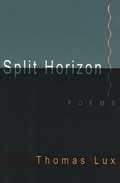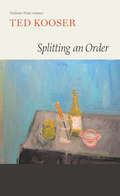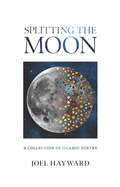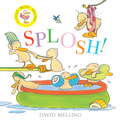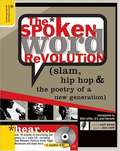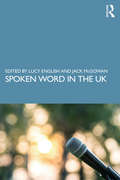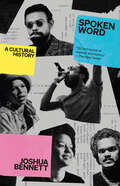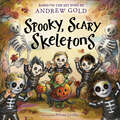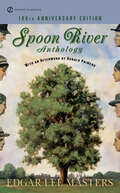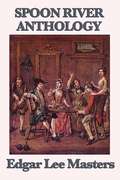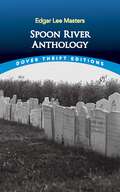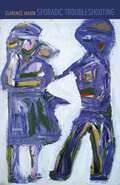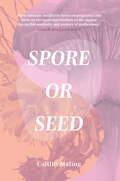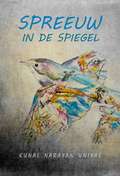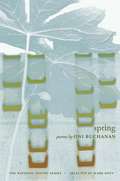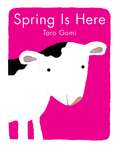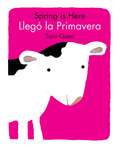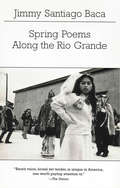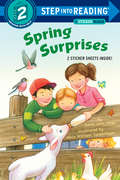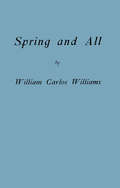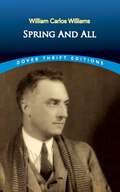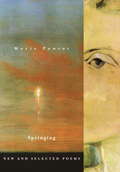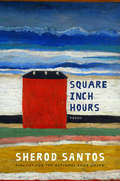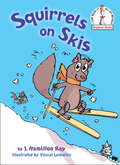- Table View
- List View
Split Horizon
by Thomas LuxThomas Lux is the author of such books as Sunday, Half Promised Land, and The Drowned River. His poetry has been fulfilling every expectation by penetrating deeper into the plain-spoken, saturnine, witty language that he virtually invented. In his latest work, Lux's level gaze, cool talk, weird rhythms, and quirky humor place him in a special territory - entirely original - of contemporary American poetry. These new poems, like Split Horizon itself, have unusual titles (Loudmouth Soup, Virgule,Each Startled Touch Returns the Touch Unstartled) and circle around their subjects in strange ways, most often dealing with the lonely oddity of the individual in a society that inflexibly ignores individuality.
Splitting an Order
by Ted KooserOne of the "Big Indie Books of Fall 2014"--Publishers Weekly "Ted Kooser must be the most accessible and enjoyable major poet in America. His lines are so clear and simple. "--Michael Dirda,The Washington Post "Readers [of Splitting an Order] will find 'characters’ both strange and wonderful, animal or human. There is a sense that time is passing quickly and that everything worthy must be captured and savored, from an old couple lovingly sharing a sandwich to another sowing seed potatoes to a tribute to an old dog who waits as age and winter approach. . . Master of the single-metaphor poem, Kooser offers images that evolve, fluid and unforced. ”--Library Journal, starred review "Wisdom, compassion, and dignity continue to mark the poetry of Ted Kooser. . . Splitting an Order [is] a quiet collection that honors small victories and gives reasons to be hopeful. "--Elizabeth Lund, The Christian Science Monitor "Kooser's ability to discover the smallest detail and render it remarkable is a rare gift. "--Bloomsbury Review Pulitzer Prize winner and best selling poet Ted Kooser calls attention to the intimacies of life through commonplace objects and occurrences: an elderly couple sharing a sandwich is a study in transcendent love, while a tattered packet of spinach seeds calls forth innate human potential. This long-awaited collection from the former U. S. Poet Laureate--ten years in the making--is rich with quiet and profound magnificence. From "Splitting an Order": I like to watch an old man cutting a sandwich in half . . . and then to see him lift half onto the extra plate that he asked the server to bring, and then to wait, offering the plate to his wife while she slowly unrolls her napkin and places her spoon, her knife and her fork in their proper places, then smoothes the starched white napkin over her knees and meets his eyes and holds out both old hands to him. Ted Kooser is the author of numerous books of poetry and prose, including Delights and Shadows (Copper Canyon Press), which won the Pulitzer Prize. A former US Poet Laureate, Kooser serves as editor for "American Life in Poetry," a nationally syndicated weekly newspaper column.
Splitting the Moon: A Collection of Islamic Poetry
by Joel Hayward'Splitting the Moon' tracks scholar and author Dr Joel Hayward's intriguing journey into Islam, his fascination with the mysteries of faith, his experiences and observations as a Western Muslim and his thoughts on the state of the Ummah (Islamic community) today. He writes his poetry to capture events each day in the way that some people keep a diary. They are therefore deeply personal, yet reflect the ever-changing world around him.
Splosh! (Splosh!)
by David MellingThis bright, bold rhyming story from the creator of Hugless Douglas is a wonderfully funny introduction to numbers and counting for the very young and great to read aloud.Count from one to ten with the adorable Splosh and his hilarious fluffy duck friends as they waddle, quack and flap along the diving board. Will they be brave enough to dive into the paddling pool?Don't miss Colour with Splosh! - the second book in this popular series and a brilliant introduction to colours.Praise for Hugless Douglas: 'A new Hugless Douglas book is always a cause for celebration.' Daily Mail
Spoken Word Revolution: Slam, Hip Hop And The Poetry Of A New Generation (A Poetry Speaks Experience)
by Marc Smith Mark Eleveld"A dynamic and clarifying volume chock-full of fresh and informative commentary...and an exciting array of knock-out poems." -Booklist Starred Review "Accompanied by a terrific CD that showcases the great variety of styles performance poetry embraces, from the purest of recitations to seductive musical presentations, this dynamic anthology embodies the thrilling and mutually beneficial rapprochement between the traditionalists and the slammers, something that seemed about as likely 10 years ago as that proverbial cold day in hell." -Chicago Tribune The Spoken Word Revolution brings to life the written and performed works of more than 40 of the most influential slam, hip hop, performance art and contemporary poets in the world today. This defining collection of spoken word poetry captures today's electrifying words and voices, in text and immediately live on one audio CD.
Spoken Word in the UK
by Lucy EnglishSpoken Word in the UK is a comprehensive and in-depth introduction to spoken word performance in the UK – its origins and development, its performers and audiences, and the vast array of different styles and characteristics that make it unique. Drawing together a wide range of authors including scholars, critics, and practitioners, each chapter gives a new perspective on performance poetics. The six sections of the book cover the essential elements of understanding the form and discuss how this key aspect of contemporary performance can be analysed stylistically, how its development fits into the context of performance in the UK, the ways in which its performers reach and engage with their audiences, and its place in the education system. Each chapter is a case study of one key aspect, example, or context of spoken word performance, combining to make the most wide-ranging account of this form of performance currently available. This is a crucial and ground-breaking companion for those studying or teaching spoken word performance, as well as scholars and researchers across the fields of theatre and performance studies, literary studies, and cultural studies.
Spoken Word: A Cultural History
by Joshua BennettA NEW YORK TIMES NOTABLE BOOK OF THE YEAR • A &“rich hybrid of memoir and history&” (The New Yorker) of the literary art form that has transformed the cultural landscape, by one of its influential practitioners, an award-winning poet, professor, and slam champion&“Bennett…transport[s] us back to the city blocks, bars, cafes and stages these artists traversed and inhabited…an instructive text for young poets, artists or creative entrepreneurs trying to find a way to carve out a space for themselves…Shines with a refreshing dynamism.&” —The New York TimesIn 2009, when he was twenty years old, Joshua Bennett was invited to perform a spoken word poem for Barack and Michelle Obama, at the same White House "Poetry Jam" where Lin-Manuel Miranda declaimed the opening bars of a work-in-progress that would soon revolutionize American theater. That meeting is but one among many in the trajectory of Bennett's young life, as he rode the cresting wave of spoken word through the 2010s. In this book, he goes back to its roots, considering the Black Arts movement and the prominence of poetry and song in Black education; the origins of the famed Nuyorican Poets Cafe in the Lower East Side living room of the visionary Miguel Algarín, who hosted verse gatherings with legendary figures like Ntozake Shange and Miguel Piñero; the rapid growth of the "slam" format that was pioneered at the Get Me High Lounge in Chicago; the perfect storm of spoken word's rise during the explosion of social media; and Bennett's own journey alongside his older sister, whose work to promote the form helped shape spaces online and elsewhere dedicated to literature and the pursuit of human freedom. A celebration of voices outside the dominant cultural narrative, who boldly embraced an array of styles and forms and redefined what—and whom—the mainstream would include, Bennett's book illuminates the profound influence spoken word has had everywhere melodious words are heard, from Broadway to academia, from the podiums of political protest to cafés, schools, and rooms full of strangers all across the world.
Spooky, Scary Skeletons
by Andrew GoldSpooky, scary skeletons…will send shivers down your spine in this adorable sing-along picture book based on the TikTok viral song by Andrew Gold (best known for writing The Golden Girls theme song, "Thank You for Being a Friend.")Follow along as five little skeletons go trick-or-treating on Halloween night. But when they take their scares too far, can a skeleton dance save the day?Andrew Gold released "Spooky, Scary Skeletons" in 1996. Since then, it has become a viral sensation, with over 8 billion views on both YouTube and TikTok... and counting! Now, fans of all ages can sing along to the complete lyrics, which have been paired with playful illustrations. Spooky, scary skeletonsSpeak with such a screech—You'll SHAKE and SHUDDER in surpriseWhen you hear these zombies shriek. An ideal read-aloud for Halloween or ANY time of year, this is sure to become a cherished part of family bookshelves for years to come.
Spoon River Anthology
by Masters Edgar LeeThe book has no illustrations or index. Purchasers are entitled to a free trial membership in the General Books Club where they can select from more than a million books without charge. Subjects: Epitaphs; Cemeteries; Illinois; Literary Criticism / General; Poetry / General; Fiction / Literary; Drama / American; Poetry / General; Poetry / Anthologies; Poetry / American / General; Poetry / English, Irish, Scottish, Welsh;
Spoon River Anthology
by Edgar Lee MastersIn the town of Spoon River, the dead are given a last chance to speak to the living in the form of epitaphs written on their tombstones.
Spoon River Anthology
by Edgar Lee MastersSpoon River Anthology, by Edgar Lee Masters, is a collection of short free-form poems that collectively describe the life of the fictional small town of Spoon River, named after the real Spoon River that ran near Masters' home town. The collection includes two hundred and twelve separate characters, all providing two-hundred forty-four accounts of their lives and losses
Spoon River Anthology: Edgar Lee Masters Best Workl (Dover Thrift Editions)
by Edgar Lee MastersIn Spoon River Anthology, the American poet Edgar Lee Masters (1869-1950) created a series of compelling free-verse monologues in which former citizens of a mythical Midwestern town speak touchingly from the grave of the thwarted hopes and dream of their lives. First published in book form in 1915, the Anthology was the crowning achievement of Masters' career as a poet, and a work that would become a landmark of 20th-century American literature. In these pages, no less than 214 individual voices are heard -- some in no more than a dozen moving lines. Alternately plaintive, anguished, enigmatic, angry, and contemptuous, the voices of Spoon River, although distinctively small-town Americans, evoke themes of love and hope, disappointment and despair that are universal in their resonance. This American classic is reprinted here from the authoritative 1915 edition.
Sporadic Troubleshooting: Poems
by Clarence MajorDeeply felt and brimming with humor and philosophical inquiry, Sporadic Troubleshooting, the latest volume from Clarence Major, both acknowledges poetic literary tradition and explores exciting new territories in language. Throughout, Major uses an improvisational technique, applying it to well-known mythological stories to enhance narrative and lyrical intensity. Breathtakingly vivid, these poems are testaments to universal subjects such as love, charity, nature, fear, survival, loyalty, justice, and beauty. Major’s poems offer vigorous inquiries into life and art with a view toward renewal and transformation.
Spore or Seed
by Caitlin MalingIn this powerful fifth collection of poetry, Caitlin Maling explores the transformative experience of motherhood, from gestation to birth and beyond. With an ever-keen eye for the natural world, she delves into the beauty and complexity of the maternal experience, weaving in elements of eco-poetry to explore the interconnectedness of all life. In the spirit of Judith Wright and Gwen Harwood, this collection of poetry explores the transformative power of motherhood and the discovery of a new, expanded self. Through evocative and intimate verse, and some stunning poem sequences, the poet delves into the complex experience of losing one's identity as one assumes the role of motherhood. This beautifully written and moving book is a must-read for any mother or anyone interested in the nuances and ambivalences of the maternal experience.
Spreeuw in de spiegel
by Kunal Narayan Uniyal L. N.Sinds de daad van ongehoorzaamheid is de mens voortdurend in oorlog geweest met zijn grootste tegenstander, zijn EGO. Hoe meer hij toegeeft aan zijn ego, hoe verder hij van zijn goddelijke zelf komt. Zijn materialistische motieven, zijn zoektocht naar macht en grove onverschilligheid vervreemden hem en isoleerden hem. In slavernij door het ego geniet de man van valse trots, valsheid van de valsheid en valsste beveiliging. De zoektocht eindigt nooit. De dorst is nooit uitgeblust. De geest blijft pre-occupied. Het hart ziet in beroering. Koude rede betrekt wijsheid en de menselijke geboorte hunkeren naar rechtvaardiging. Toch heeft de welwillende heer een masterplan. We zijn allemaal begiftigd met zijn koninkrijk binnenin. Op het moment dat we onze reis naar binnen beginnen, begint de mist te verdwijnen. Oneindige wijsheid komt tot leven. Alle ruis houdt op en kalmte dringt binnen. Echte vreugde komt voort uit het hart en leidt naar vrede, harmonie en evenwicht. Het enige wat je nodig hebt is slechts een pauze en een kijkje binnenin
Spring
by Oni Buchanan2009 Massachusetts Book Awards Winner Representing nothing less than a tour-de-force of formal invention and emotional intensity, Oni Buchanan's Spring encompasses radically contrasting work. Ecstatic, visually intricate rhapsodies are juxtaposed with tight, sonnet-like poems, and wispy columns of verse brush up against large-scale epics and kinetic text. This collection's point of departure is the paradox of existence as an individual in a political and violent world. All of the formal innovations in this book have in common an urgent need for texture and polyphony, and the poems attempt to discover how to fulfill the individual human responsibility of surviving as a resiliently loving and hopeful living creature. An accompanying multimedia compact disc offers a full Flash-animated version of the printed kinetic work, "The Mandrake Vehicles."
Spring Is Here
by Taro GomiA winsome calf provides the backdrop--literally--for this charming story. With each turn of the page, the young animal is imaginatively transformed to reflect some activity of the four seasons: snow melting, seedlings springing up, harvest, all the way to the snow melting again and revealing that--the calf has grown. The story line follows the cycle of the seasons from one spring to the next, and its spare, fluid text--wedded to the vigorous graphics--vividly conveys the underlying themes of renewal and growth. The colors are joyful and fresh, and the artist's playful approach to perspective makes this a lovely picture book.
Spring Is Here/Llego La Primavera
by Taro GomiUn ternero bonito proporciona el fondo - literalmente - para este cuento encantador. Con cada doblada de pàgina, el animal joven se transforme imaginativamente para reflejar un cambio de las cuatro temporadas: nieve derritiendose, semillas brotando, la cosecha, regresando a la nieve derritiendose de nuevo, y revelando que el ternero ha crecido. El cuento sigue el ciclo de las temporadas de una primavera a la proxima, y su texto fluido y minimo - en combinacion con las ilustraciones vigorosos - trasmite vividamente los temas subyacentes de la renovación y el crecimiento. Los colores son alegres y juguetónes, y el enfoque lucido del artista con la perspectiva resulta en un libro lindisimo.
Spring Poems Along the Rio Grande
by Jimmy Santiago BacaIn Spring Poems Along the Rio Grande, Jimmy Santiago Baca continues his daily pilgrimage through the meadows, riverbanks, and bosques of the Rio Grande where winter dies, spring explodes, and inextricable links between the human spirit and the natural world are revealed. In Spring Poems Along the Rio Grande, Jimmy Santiago Baca continues his daily pilgrimage through the meadows, riverbanks, and bosques of the Rio Grande where winter dies, spring explodes, and inextricable links between the human spirit and the natural world are revealed--"the river and I see through each other's skins / behind the eyes into the tunnels of water-bone and rushing marrow." These poems expand upon those in Baca's recent Winter Poems Along the Rio Grande -- his visions of love and loss, poverty and renewal, redemption and war are reflected in the rocks, trees and animals of his beloved New Mexico. In Spring Poems the words of the river "rise around thorny thickets / then descend again into the burbling stubble," and the poet surrenders himself to this place where his own words are woven by "a thumbnail-sized yellow spider/ with poppy seed eyes." Born in New Mexico of Chicano and Apache descent, Jimmy Santiago Baca was raised first by his grandmother, but was later sent with his brother to an orphanage. A runaway at age thirteen, it was after Baca was sentenced to five years in a Federal prison at the age of twenty-one that he began to turn his life around: there he learned to read and write and found his passion for poetry. His memoir A Place To Stand won the prestigious International Award. He is Champion of the International Poetry Slam and winner of The Before Columbus American Book Award and the Pushcart Prize.
Spring Surprises (Step into Reading)
by Anna Jane Hays Hala Swearingen WittwerSay goodbye to winter and celebrate all the fun and exciting surprises springtime offers—like flying kites, making mud pies, watching new baby animals take their first steps, and dancing among the raindrops! This joyful ode to all things spring is filled with easy-to-decode rhymed text and bright, inviting art. Spring Surprises includes two sheets of stickers.
Spring and All (Facsimile Edition)
by C. D. Wright William Carlos WilliamsA beautiful facsimile of the 1923 original edition which is considered "one of the greatest poems of the twentieth century". (The New York Times) Spring and All is a manifesto of the imagination -- a hybrid of alternating sections of prose and free verse that coalesce in dramatic, energetic, and beautifully cryptic statements of how language re-creates the world. Spring and All contains some of Williams's best-known poetry, including Section I, which opens, "By the road to the contagious hospital," and Section XXII, where Williams penned his most famous poem, "The Red Wheelbarrow." Now, almost 90 years since its first publiction, New Directions publishes this facsimile of the original 1923 Contact Press edition, featuring a new introduction by C. D. Wright.
Spring and All: Kora In Hell / Spring And All / The Descent Of Winter / The Great American Novel / A Novelette And Other Prose (Dover Thrift Editions)
by William Carlos WilliamsHeavily influenced by T. S. Eliot's "The Waste Land," the poems of Spring and All express the author's beliefs about the role and form of art in a modern context. William Carlos Williams offers an intensely stylized set of exercises in reduction that capture, in his words, "the immediacy of experiences." Sections of vivid, sensuous prose — described by the poet as "a mixture of philosophy and nonsense"—alternate with straightforward free verse that explores the creative uses of imagination and the power of language. "Spring and All," the title work of this 1923 collection, represents Williams's first major achievement as a poet, and was praised by The New York Times as one of the greatest poems of the twentieth century. This groundbreaking compilation also features some of the poet's best-known verse, including the modernist masterpieces: "The Red Wheelbarrow" and "To Elsie."
Springing
by Marie PonsotFrom the award-winning author of The Bird Catcher, this life-spanning volume offers the delight of both discovery and re-discovery, as Ponsot tends the unruly garden of her mind with her customary care and passion. The book opens with a group of new poems, including "What Would You Like to Be When You Grow Up?"--a question that has kept Ponsot's work vital for more than five decades. Throughout the selections from her four earlier books and a trove of previously unpublished work covering the years 1946 to 1971, she offers us a "lost haven in a springing world." Sometimes sharp in her self-perception, but always listing toward pleasure and elegance, unafraid of grief and the passage of time, Ponsot continually refreshes her language and the spirited self from which it emerges.From the Hardcover edition.
Square Inch Hours: Poems
by Sherod SantosA vividly rendered collection tracing the aftermath of a breakdown and the struggle to reconnect with the realities of daily life. In the manner of a poetic meditation, Square Inch Hours draws on elements from fiction, memoir, daybook, and reverie, piecing together moments that follow in the aftermath of a breakdown. Writing from an area outside psychology or personal history, the intensely solitary speaker relates the experience of reengaging with the world. With an adamant attentiveness, he turns his focus to observing reality in its minutest particulars: the expression on the face of a random passerby; the palsied hand of a grocery clerk; copulating flies on a windowsill; a deep gouge, like a bullet hole, in his apartment door. How he perceives is how he reconnects. The title, Square Inch Hours, expresses that impulse to capture each moment, as in the square of a photograph.
Squirrels on Skis (Beginner Books(R))
by Pascal Lemaitre J. Hamilton RayThis new Beginner Book about manic skiing squirrels--by J. Hamilton Ray with illustrations by Pascal Lemaitre--has the feeling of an old classic read-aloud. "Nobody knew how the mania grew. First there was one, and then there were two. Three more came gliding from under the trees. LOOK! On the hill. Those are squirrels on skis! Below lay the town, snow-covered and still. Not a sound could be heard. All was silent, until . . . Swwwishhhh swooped the skiers, all dressed for play. Eighty-five squirrels and more on the way!" As you can imagine, the townsfolk are NOT amused. Can intrepid reporter Sally Sue Breeze find out where the squirrels are getting their skis-and make them stop skiing long enough to eat lunch-before pest-control guy Stanley Powers sucks them up in his vacuum device? (Don't worry--Sally triumphs in a most unexpected way.) With delightfully understated, funny illustrations by Pascal Lemaitre, this is the perfect book for beginning readers to curl up and chill out with on a snow day--or any day!
